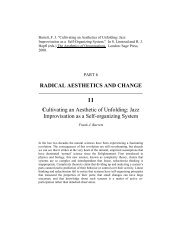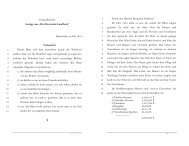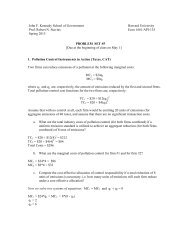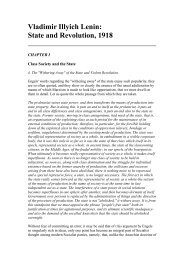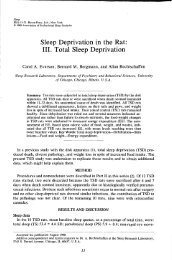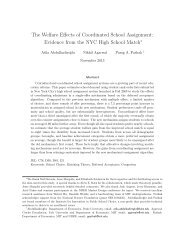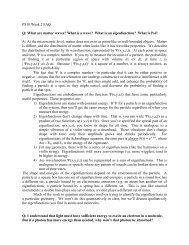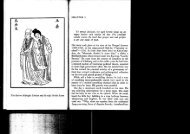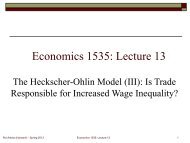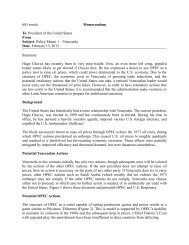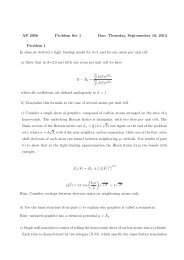Bowie, A. M. 1982. "The Parabasis in Aristophanes ... - iSites
Bowie, A. M. 1982. "The Parabasis in Aristophanes ... - iSites
Bowie, A. M. 1982. "The Parabasis in Aristophanes ... - iSites
You also want an ePaper? Increase the reach of your titles
YUMPU automatically turns print PDFs into web optimized ePapers that Google loves.
<strong>The</strong> <strong>Parabasis</strong> <strong>in</strong> <strong>Aristophanes</strong>: Prolegomena, Acharnians<br />
Author(s): A. M. <strong>Bowie</strong><br />
Reviewed work(s):<br />
Source: <strong>The</strong> Classical Quarterly, New Series, Vol. 32, No. 1 (1982), pp. 27-40<br />
Published by: Cambridge University Press on behalf of <strong>The</strong> Classical Association<br />
Stable URL: http://www.jstor.org/stable/638735 .<br />
Accessed: 17/10/2012 19:56<br />
Your use of the JSTOR archive <strong>in</strong>dicates your acceptance of the Terms & Conditions of Use, available at .<br />
http://www.jstor.org/page/<strong>in</strong>fo/about/policies/terms.jsp<br />
.<br />
JSTOR is a not-for-profit service that helps scholars, researchers, and students discover, use, and build upon a wide range of<br />
content <strong>in</strong> a trusted digital archive. We use <strong>in</strong>formation technology and tools to <strong>in</strong>crease productivity and facilitate new forms<br />
of scholarship. For more <strong>in</strong>formation about JSTOR, please contact support@jstor.org.<br />
.<br />
http://www.jstor.org<br />
Cambridge University Press and <strong>The</strong> Classical Association are collaborat<strong>in</strong>g with JSTOR to digitize, preserve<br />
and extend access to <strong>The</strong> Classical Quarterly.
Classical Quarterly 32 (i) 27-40 (1982) Pr<strong>in</strong>ted <strong>in</strong> Great Brita<strong>in</strong> 27<br />
THE PARABASIS IN ARISTOPHANES:<br />
PROLEGOMENA, ACHARNIANS<br />
In this article, an <strong>in</strong>troduction to a proposed more comprehensive treatment of the<br />
subject, I wish to discuss the contribution that the parabasis makes to the understand<strong>in</strong>g<br />
and <strong>in</strong>terpretation of <strong>Aristophanes</strong>' comedies. <strong>The</strong> study of this part of the plays has<br />
<strong>in</strong> the past concentrated upon two ma<strong>in</strong> areas: firstly, its role <strong>in</strong> the development of<br />
comedy, <strong>in</strong>clud<strong>in</strong>g questions about its orig<strong>in</strong>al position <strong>in</strong> the dramatic structure and<br />
its relationship to other elements such as the parodos and agon; and secondly, its role<br />
as the repository of <strong>Aristophanes</strong>' personal views.1 I shall touch but <strong>in</strong>cidentally on<br />
the first of these, though my argument will have some bear<strong>in</strong>g on it; to the second<br />
I shall return at the end. My aim is to consider an aspect of the parabasis that has<br />
not so much been neglected as dismissed as non-existent: the relation between the<br />
contents of the parabasis and those of the rest of the play. It is generally agreed that<br />
the parabasis deals with matters that are irrelevant to the dramatic action, but I wish<br />
to argue that it has a significant role as the focus of the most important themes <strong>in</strong><br />
the play: far from break<strong>in</strong>g up the unity of the play, the parabasis provides <strong>in</strong>dications<br />
as to where that unity is to be found, besides giv<strong>in</strong>g h<strong>in</strong>ts about the mean<strong>in</strong>g of the<br />
play and the nature of Aristophanic comedy generally.2<br />
When we have the parabases of but n<strong>in</strong>e plays by a s<strong>in</strong>gle author, written some sixty<br />
to n<strong>in</strong>ety years after the traditional date for the grant<strong>in</strong>g of the first comic chorus by<br />
the archon,3 plus fragmentary rema<strong>in</strong>s which may or may not come from parabases,4<br />
any reconstruction of the early history of the parabasis is necessarily highly<br />
problematic.5 It has been suggested that the parabasis was the 'Kern und Urgebilde'<br />
1 On the parabasis <strong>in</strong> general, see most recently G. M. Sifakis, <strong>Parabasis</strong> and Animal Choruses<br />
(London, 1971), with full bibliography. <strong>The</strong> pr<strong>in</strong>cipal studies are: T. Ziel<strong>in</strong>iski, Die Gliederung<br />
der altattischen Kom6die (Leipzig, 1885); P. W. Harsh,' <strong>The</strong> Position of the <strong>Parabasis</strong> <strong>in</strong> the Plays<br />
of <strong>Aristophanes</strong>', TAPA 65 (1934), 178-97; H. Herter, Vom dionysischen Tanz zum komischen<br />
Spiel (Iserlohn, 1947), pp. 31 ff. (particularly valuable reviews of earlier scholarship); T. Gelzer,<br />
Der epirrhematische Agon bei <strong>Aristophanes</strong> (Munich, 1960), pp. 203-12, 255-7; E. Fraenkel, 'Die<br />
Parabasenlieder', <strong>in</strong> Beobachtungen zu <strong>Aristophanes</strong> (Rome, 1962), pp. 191-215 (repr. <strong>in</strong><br />
H.-J. Newiger (ed.), <strong>Aristophanes</strong> und die alte Kom6die (Darmstadt, 1975), pp. 30-54); P. H<strong>in</strong>del,<br />
Formen und Darstellungsweisen <strong>in</strong> der aristophanischen Kom6die (Heidelberg, 1963), pp. 84-111.<br />
2 <strong>The</strong> charge of irrelevance needs no exemplification, but has recently been restated by<br />
K. J. Dover, Aristophanic Comedy(London, 1972), p. 52, K. McLeish, <strong>The</strong> <strong>The</strong>atre of<strong>Aristophanes</strong><br />
(London, 1980), pp. 91 f., and with reference to Acharnians by K.-D. Koch, Kritische Idee und<br />
komisches <strong>The</strong>ma, ed. 2 (Bremen, 1968), p. 24. Only Harsh (n. 1), pp. 187 f. has considered the<br />
question of l<strong>in</strong>ks, but <strong>in</strong> a very broad fashion; for Knights, cf. M. Landfester, Die Ritter des<br />
<strong>Aristophanes</strong> (Amsterdam, 1967), pp. 40-4; for Lysistrata, J. Vaio, '<strong>The</strong> Manipulation of <strong>The</strong>me<br />
and Action <strong>in</strong> <strong>Aristophanes</strong>' Lysistrata', GRBS 14 (1973), 371 f.<br />
486 B.C.; cf. D. W. Lucas on Arist. Poet. 1449b. 1-2 (Aristotle:. Poetics, Oxford 1968, p. 90).<br />
On fragments of other poets which may come from parabases, cf. M. Whittaker, '<strong>The</strong> Comic<br />
Fragments <strong>in</strong> their Relation to the Structure of Old Attic Comedy', CQ 29 (1935), 188-91.<br />
C. Her<strong>in</strong>gton, <strong>in</strong> a review of Sifakis, cautions aga<strong>in</strong>st too hasty an ascription of fragments to<br />
parabases, Phoenix 26 (1972), 292-4.<br />
5 Attempts to reconstruct backwards, as if a l<strong>in</strong>guistic problem were <strong>in</strong>volved, are especially<br />
dangerous. Compare, for <strong>in</strong>stance, A. Pickard-Cambridge, Dithyramb, Tragedy and Comedy (ed.<br />
2 by T. B. L. Webster, Oxford, 1962), p. 143: 'the fact that we can trace the steps by which<br />
<strong>Aristophanes</strong> attempted to work it better <strong>in</strong>to the whole, suggests that if we were able to trace<br />
its development backwards, we should f<strong>in</strong>d that it was orig<strong>in</strong>ally a non-dramatic performance'.<br />
Harsh (n. 1), p. 186 n. 18, argues <strong>in</strong> quite the opposite direction: 'the parabasis was orig<strong>in</strong>ally<br />
relevant to the theme of the rema<strong>in</strong>der of the play, but came <strong>in</strong> time to be used for any cause<br />
which the poet might choose'.
28 A. M. BOWIE<br />
of comedy,6 but there is no evidence to decide this either way. It does look to be old,7<br />
but it is uncerta<strong>in</strong> whether the non-responsive part is as old as the epirrhematic.8 <strong>The</strong><br />
question of the orig<strong>in</strong>al position of the parabasis seems now to have been settled <strong>in</strong><br />
favour of the middle of the play, at a po<strong>in</strong>t where a natural pause is reached <strong>in</strong> the<br />
action.9 Ever s<strong>in</strong>ce Zieliriski suggested the parabasis had orig<strong>in</strong>ally ended the plays,<br />
with the chorus remov<strong>in</strong>g their disguises, this question has been much debated, with<br />
beg<strong>in</strong>n<strong>in</strong>g, middle, and end all be<strong>in</strong>g supported as the orig<strong>in</strong>al position.10 <strong>The</strong> most<br />
recent discussion, by Sifakis, collects and adduces strong arguments for the middle.<br />
Not the least of his po<strong>in</strong>ts is to show that the idea of 'break<strong>in</strong>g the dramatic illusion',<br />
on which those who wished to transpose the parabasis based many of their arguments,<br />
is really anachronistic for fifth-century Greece."1 In support of Sifakis, one can add<br />
that those who saw the parabasis as an orig<strong>in</strong>al epilogue were argu<strong>in</strong>g from the premiss<br />
that the scenes which follow it are largely irrelevant and were added to Attic comedy<br />
under Doric <strong>in</strong>fluence.12 As I shall try to show, these scenes are not irrelevant but are<br />
closely l<strong>in</strong>ked to the earlier ones: there is no need even to have recourse with Sifakis<br />
to Brecht's notion of 'epic' theatre, with its pr<strong>in</strong>ciple of 'jede Szene fiir sich'.<br />
<strong>The</strong> parabasis, then, can be used to show that <strong>Aristophanes</strong>' plays have a much<br />
greater unity than is sometimes allowed, and I propose to discuss Acharnians to<br />
<strong>in</strong>dicate some of the basic contributions a read<strong>in</strong>g through the parabasis can make.<br />
<strong>The</strong> parabasis of the Acharnians (626-718) falls naturally <strong>in</strong>to two parts: (1) the<br />
anapaests13 with the pnigos, <strong>in</strong> which <strong>Aristophanes</strong> defends himself aga<strong>in</strong>st the charge<br />
6 W. Kranz, Stasimon (Berl<strong>in</strong>, 1933), p. 25. For other proponents of this theory cf. Herter (n.<br />
1), p. 54 n. 152, to which add H. Genz, de Parabasi, (Diss. Berl<strong>in</strong> 1865), pp. 6 ff., and G. Kaibel,<br />
'Zur attischen Kom6die', Hermes 24 (1889), 38.<br />
7 T. Gelzer, 'Dionysisches und Phantastisches <strong>in</strong> der Kom6die des <strong>Aristophanes</strong>', Probleme<br />
der Kunstwissenschaft 2 (1966), 55-70. On the historical relationship between epirrhematic agon,<br />
parodos and parabasis, see <strong>in</strong> general Pickard-Cambridge (n. 5), pp. 147-51, with Webster's<br />
criticisms, pp. 159-62. On the agon and parabasis, Herter (n. 1), pp. 31-3, 55 n. 165<br />
(bibliography); Gelzer has recently suggested that the similarity <strong>in</strong> form is fortuitous, but Sifakis<br />
(n. 1), pp. 53-60 po<strong>in</strong>ts out that the epirrhematic form is more appropriate to the agon and<br />
probably orig<strong>in</strong>ated there.<br />
I Sifakis, pp. 60-8.<br />
9 For this pause, cf. H<strong>in</strong>del (n. 1), pp. 86 f.<br />
10 <strong>The</strong> pr<strong>in</strong>cipal proponents of each view are conveniently listed by Gelzer (n. 1), p. 212 n.<br />
1 (though note, with Harsh (n. 1), pp. 194 f., that Poppelreuter, de comoediae atticae primordiis<br />
particulae duae (Diss. Berl<strong>in</strong> 1893), pp. 32 ff., though credited with the parabasis-prologue idea,<br />
ultimately rejected the need to move the parabasis); cf. Sifakis (n. 1), pp. 15-21 for the pr<strong>in</strong>cipal<br />
theories, with references. A. Sodano, 'La parodos parabatica dei Pluti di Crat<strong>in</strong>o. Metrica e<br />
struttura', Rend. Acad. Arch. Lettere e Belle Arti di Napoli 36 (1961), 37-54, argues for the<br />
parabasis-parodos theory on the not very conv<strong>in</strong>c<strong>in</strong>g grounds of the parabasis-like parodoi of<br />
Crat<strong>in</strong>us' Pluti and <strong>Aristophanes</strong>' Frogs.<br />
11 'Break<strong>in</strong>g the dramatic illusion' is not, of course, the only argument for transposition: see<br />
Sifakis (n. 1), pp. 17 and 55-68. On 'break<strong>in</strong>g the illusion' cf. recently McLeish (n. 2), pp. 64-92;<br />
F. Muecke, 'Play<strong>in</strong>g with the Play: theatrical self-consciousness <strong>in</strong> <strong>Aristophanes</strong>', Antichthon<br />
11 (1977), 52-67; D. Ba<strong>in</strong>, Actors and Audience (Oxford, 1977), pp. 3-12 and 208-22.<br />
12 So Zielifiski, pp. 242 ff. On the possible Doric orig<strong>in</strong> of the iambic scenes cf. Pickard-<br />
Cambridge (n. 5), pp. 162-210, with Webster's qualifications at pp. 173 f. and 177 f.; J. Henderson,<br />
<strong>The</strong> Maculate Muse (New Haven and London, 1975), pp. 223-8; and most importantly,<br />
L. Breitholz, Die dorische Farce im griechischen Mutterland vor dem 5. Jahrhundert. Hypothese<br />
oder Realitdit? (Stockholm, 1960).<br />
13 I shall refer to this section throughout as the 'anapaests'; it is also known as the 'parabasis<br />
proper' and irAozv, but I shall reserve 'parabasis' for the whole, as some ancient critics did<br />
(cf. Gelzer (n. 1), p. 204 n. 3). All the extant plays have anapaests here except the Clouds with<br />
Eupolideans. On the metres of the parabasis, cf. Whittaker (n. 4) and Sifakis (n. 1), pp. 33-6,<br />
45-51. On the ancient term<strong>in</strong>ology, R. Cantarella, Aristofane. Le commedie.: I. Prolegomeni<br />
(Milan, 1949), pp. 98-102.
THE PARABASIS IN ARISTOPHANES 29<br />
of hav<strong>in</strong>g slandered the Athenians, and (2) the epirrhematic syzygy, where the chorus,<br />
speak<strong>in</strong>g now as old men, compla<strong>in</strong> of their treatment <strong>in</strong> the law-courts at the hands<br />
of the young. At first sight, these two subjects may seem to have little to do with either<br />
each other or the dramatic action, but closer analysis of the details and especially of<br />
the underly<strong>in</strong>g themes will show that the material of the parabasis <strong>in</strong> fact reflects the<br />
most important aspects of the play.<br />
One may beg<strong>in</strong> with what are the two basic functions of the parabasis. Firstly, it<br />
serves to identify the poet with his hero: what <strong>Aristophanes</strong> says of himself <strong>in</strong> the<br />
parabasis co<strong>in</strong>cides with what happens to his hero <strong>in</strong> the play, and both are seen to<br />
be <strong>in</strong>volved <strong>in</strong> the same sort of problems and engaged <strong>in</strong> the same sort of attempts<br />
to put them right. In Acharnians, after the chorus have been won over to the hero's<br />
view of th<strong>in</strong>gs, they too can be <strong>in</strong>cluded <strong>in</strong> this identification. <strong>The</strong>se problems fac<strong>in</strong>g<br />
poet, hero and chorus are presented as caus<strong>in</strong>g distress not only to them <strong>in</strong> the play,<br />
but also to Athens generally and to Greece as a whole. <strong>The</strong> second function is then<br />
to gather together and emphasize the particular faults that have been exposed <strong>in</strong> the<br />
first half of the play, which will subsequently be shown to have been rectified as a result<br />
of Dicaeopolis' treaty. <strong>The</strong> parabasis thus acts as a focus or, as Mr Seager has<br />
suggested to me, a prism through which the play's chief themes are passed: it highlights<br />
the areas <strong>in</strong> which the hero (and so, by implication, the poet) br<strong>in</strong>gs benefits to the<br />
city.14 <strong>The</strong> second part of the play is <strong>in</strong> many ways a mirror-image of the first: <strong>in</strong> the<br />
latter, the world is <strong>in</strong> chaos because of its faults, but later a k<strong>in</strong>d of order is restored<br />
as the problems are solved.15 At the same time, I should state at the outset that I do<br />
not wish to argue that the play is a sermon or a serious piece of social and political<br />
criticism. <strong>The</strong> union between poet and hero for the apparent benefit of the city is<br />
underm<strong>in</strong>ed by a variety of comic devices and by the fact that Dicaeopolis' world is<br />
not as paradisiacal as it may seem. <strong>The</strong>re exists a tension between the implied<br />
'message' that a peace treaty would be a good idea and the terms <strong>in</strong> which this is<br />
embodied.<br />
1. Poet, hero and chorus. <strong>The</strong> identification of poet and hero is carried out ma<strong>in</strong>ly<br />
through the similarities between the anapaests of the parabasis and two scenes from<br />
the first half of the play: Dicaeopolis' speech <strong>in</strong> self-defence before the Acharnians<br />
(496-556) and the open<strong>in</strong>g scenes <strong>in</strong> the Assembly.16 Broadly, the first scene equates<br />
their experiences, and the second their attempts to put th<strong>in</strong>gs right. <strong>The</strong> similarities<br />
are as follows.<br />
14 This identification of poet and hero is not uncommon <strong>in</strong> the early plays, so it is not true<br />
to say, with de Ste Croix, that Dicaeopolis is the character who 'alone of <strong>Aristophanes</strong>'<br />
characters of whom we know anyth<strong>in</strong>g is carefully and explicitly identified with the poet himself'<br />
(G. E. M. de Ste Croix, <strong>The</strong> Orig<strong>in</strong>s of the Peloponnesian War (London, 1972), p. 363). Nor, as<br />
will become clear, can I agree with him that this means that Dicaeopolis is speak<strong>in</strong>g for<br />
<strong>Aristophanes</strong>.<br />
15 <strong>The</strong> pattern of the play is thus that common <strong>in</strong> ritual, where a period of chaos is followed<br />
by the imposition of order. This raises the question of comedy's relation to ritual, to which I<br />
shall return <strong>in</strong> a subsequent study of the Knights. I shall suggest that that play is based upon<br />
a common myth-type, a gigantomachy form<strong>in</strong>g the climax of a succession myth. If this is<br />
accepted, then it allows one to offer explanations for the sudden changes at the end of the play,<br />
and to account for the base character of the sausage-seller, who is supposed to be the saviour<br />
of Athens.<br />
16 C. Bailey suggested (<strong>in</strong> 'Who Played " Dicaepolis"?' Greek Poetry and Life (Oxford, 1936),<br />
pp. 231-40) that <strong>Aristophanes</strong> himself took the lead<strong>in</strong>g role, which would give added po<strong>in</strong>t, but<br />
is unlikely: cf. C. F. Russo, Aristofane autore di teatro (Florence, 1962), pp. 59 ff.<br />
2 OCQ
30 A. M. BOWIE<br />
This is the first time that either of them has spoken out explicitly.'7 Dicaeopolis has<br />
f<strong>in</strong>ally been driven to act by the behaviour of the Assembly:<br />
.<br />
37 vvv ovv TEXvCS )KW rKLp<br />
rapEafKEVaUCLEVo<br />
foav, VTOKpOELV, AOLSOPEEV TOVS p70TopaS.<br />
<strong>Aristophanes</strong> has held his peace so far, but the attacks force him to reply:<br />
628<br />
E oV YE Xopoa'v 4 Etar77KEV 7TpYLKOS 8 aKaAol KQtoV,<br />
ov7T) 7rapflqr 7rpOs T G Earpov A4wv 8ECLs 0<br />
EUTLV"<br />
8aflaAA6pOEvog 8'....<br />
Similar attacks lead Dicaeopolis to make his defence, <strong>in</strong> which he claims that he is<br />
only tell<strong>in</strong>g the truth, however unpalatable it may be:<br />
501 Eyw 8 8EtLVdl 'Lv, 8LKaLa 8U.<br />
AWe<br />
<strong>Aristophanes</strong> says the same:<br />
645 OartL rTapEKLv8vEVU ' EV 'AOrlvaLotL ELTEZv<br />
TE 8aKata<br />
cf. 655<br />
7iT 31Kata.<br />
KWoLWLaUEtL<br />
In each case, they refer to Cleon as a potential<br />
assailant:<br />
502 ob yap LE vv yE 8LafmaAEL<br />
KAEwv O"T<br />
vwv 7TapbvrwvT7-)V 7r6?ALV KaKWSS AEyw<br />
659 7rphs<br />
KA~wv K a l 7TraAaLa80<br />
KaE aiiv Tra"ra<br />
Eli EoTEKatvEaUw.<br />
/Lo<br />
Here of course the l<strong>in</strong>k between the real <strong>Aristophanes</strong> and his hero is especially close,<br />
s<strong>in</strong>ce Dicaeopolis has earlier spoken of his prosecution by Cleon the year before for<br />
a comedy he had written, and this is exactly what had happened to <strong>Aristophanes</strong><br />
(377 ff.)."' A f<strong>in</strong>al similarity also conta<strong>in</strong>s a difference to which I shall return. In 502 f.<br />
(quoted above), Dicaeopolis showed himself aware of the effect his words might have<br />
on the allies; by contrast, <strong>Aristophanes</strong> claims that his words will have the good effect<br />
of mak<strong>in</strong>g the allies keener to br<strong>in</strong>g their tribute <strong>in</strong> order to see his plays:'"<br />
643 TroLyproTL VV &TWCV K 6TOAEWV 7Tv 6pov v<br />
ltL r7Tayov7TE<br />
7'ovaLV lMEiV<br />
TV<br />
17TLOOv/o0VTEvr~<br />
7T0 77ot7V ToV V<br />
This paradoxical claim is repeated <strong>in</strong> the words of the L.ptrov. Persian k<strong>in</strong>g to the Spartan<br />
ambassadors (646-51),20 which br<strong>in</strong>gs us to the second important scene, that with the<br />
embassies.2' <strong>Aristophanes</strong> summarizes his benefits to the city with regard to these <strong>in</strong><br />
633-40; they are briefly thus:<br />
634 rra{uaas 6EVLKOEGL A6yov /EI A'lav<br />
ztig E a7raoTaaL,<br />
07' Ms7)Oal EtVCa XaVvoOALTag.<br />
OW7EVO/LEVOVS, /L77'<br />
1' This parallel, and <strong>Aristophanes</strong>' notoriously cavalier treatment of the truth about himself,<br />
should make one wary of draw<strong>in</strong>g from such remarks conclusions about the parabases of<br />
Banqueters and Babylonians, as is done, for <strong>in</strong>stance, by Harsh (n. 1), p. 191.<br />
11 For this trial cf. C. H. Whitman, <strong>Aristophanes</strong> and the Comic Hero (Cambridge, Mass. 1964),<br />
p. 307 n. 2, and add V. Steffen, 'Qua lege fretus Cleon Aristophanem <strong>in</strong> iudicium deduxerit',<br />
Eos 48 (1956), 67-73.<br />
9 Apart from the comic exaggeration, there is also a nice ambiguity <strong>in</strong> 642. <strong>The</strong> sentence could<br />
mean, for Athenian ears, O"TL ~opoKpaTovv7at, Klat 'viv rvpavv80os gIEL11EVOL<br />
(schol.'s second <strong>in</strong>terpretation), or with an ironical reference to Babylonians, O2AA~jo, 'show<strong>in</strong>g the people<br />
<strong>in</strong> the cities just what "democratic" rule means' (cf. schol. Ach. 378).<br />
20 For Spartan overtures to Persia, cf. Thuc. 2. 67, 4. 50. Any rem<strong>in</strong>der to the Athenians of<br />
the judicial murder of the Spartan envoys <strong>in</strong> 430 here (Thuc. 2. 67. 4) would accord with the<br />
general emphasis on Athenian violence <strong>in</strong> the play (see below). See also D. M. Lewis, Sparta<br />
and Persia (Leyden, 1977).<br />
21 On the complex question of Athenian-Persian relations at this time, cf. the survey <strong>in</strong><br />
R. Meiggs, <strong>The</strong> Athenian Empire (Oxford, 1972), pp. 487-95; Lewis (n. 20), Index s.v. 'Athens'.
Compare the clos<strong>in</strong>g l<strong>in</strong>es:<br />
THE PARABASIS IN ARISTOPHANES 31<br />
657 o0<br />
O'<br />
S7TroTElvwv uteo0s Sairar6 AAOwv,<br />
OwreJ7TEWo<br />
ob0'<br />
o<br />
irE 7Tavovpywv a<br />
ol'S KarpSCov, fgAitara &8&dIKWoV.<br />
JtAAat<br />
<strong>The</strong>re are four faults here from which he is try<strong>in</strong>g to protect the Athenians: their<br />
susceptibility to 6EVLKO A6yoL,22 to flattery, to be<strong>in</strong>g XavvoTroAtaLt, and to over-reliance<br />
on j/iLOoL. Each of these has been clearly exemplified <strong>in</strong> the Assembly's deal<strong>in</strong>gs with<br />
the ambassadors, and it is here that the parallelism between the two men is especially<br />
close. Like <strong>Aristophanes</strong>, Dicaeopolis warned the Athenians aga<strong>in</strong>st the deceptions<br />
of the 'Persian'-speak<strong>in</strong>g Pseudartabas23 and his fellow ambassadors:<br />
114 QAAoW9s 6p' U7T% 7oV i0TpEflEcoWV;<br />
6arTaTWZEO'<br />
but the foreign language did fool them. Secondly, Dicaepolis expresses scorn at<br />
<strong>The</strong>orus' tale of Sitalces' writ<strong>in</strong>g 'AO-rvaioL KaAot (144) on his walls,24 and <strong>Aristophanes</strong><br />
warns them aga<strong>in</strong>st those who call them At7apcs (637-9).<br />
lorTE466vovU,<br />
Thirdly, reference to the Athenians (not uncommon <strong>in</strong> <strong>Aristophanes</strong>)25<br />
is found <strong>in</strong> Pseudartabas'<br />
XavvoroAltra<br />
Xavv6rpwKTr' 'Iaovav (104, cf. 106) and <strong>in</strong> Dicaeopolis'<br />
dismissive<br />
133 v/LEiLS<br />
SE%<br />
7TpEU31EUOEcE Ka; KEX7-VETE.<br />
F<strong>in</strong>ally, <strong>Aristophanes</strong>' refusal to offer jitLo0 recalls the false promises of gold from<br />
the Persian k<strong>in</strong>g (102 ff.) and the 1tuuo00 whose misuse Dicaeopolis so frequently<br />
bemoans (66 f., 137, 159-61, 170).<br />
<strong>Aristophanes</strong>' play and Dicaeopolis' treaty, therefore, are both responses to the<br />
same set of problems prevalent <strong>in</strong> Athens. This identification of the two has the seal<br />
set on it by the pnigos, which concludes <strong>Aristophanes</strong>' remarks on his own behalf.<br />
From the Suda,I2 we know that this passage imitated a Euripidean tragedy, which<br />
is generally taken to have been the Telephus.27 It is, after all, this play which provides<br />
much of the action from the end of the parados to the speech of Dicaeopolis. A<br />
fragment of this play also seems to lie beh<strong>in</strong>d his offer to make his case with his head<br />
on the chopp<strong>in</strong>g-board as an earnest of the truth of what he has to say (fr. 706N2):"2<br />
'Ayda't)wvov, oU'' EL 7TEAEKVV E'V XEPOEV E'XCOV<br />
t"AAot T r LS P19X?7A0V LtflQAE"V Xt6v,<br />
cry7'otQat 6&Kata y' LWTEL7TE V EXWoV.<br />
2" EVUKOaUt A6yotS has two mean<strong>in</strong>gs, both of which are significant: (1) it suggests the<br />
rhetorical fireworks of people like Gorgias (LSJ9 s.v. SEVJKS 11); (2) with the schol. SEVtKOS9 TOZ9<br />
7Trr6 7TOv VEVoV AEyotEVOLSt.<br />
7TpEo3Ewv H. Weber, <strong>Aristophanes</strong>-Studien (Leipzig, 1908), pp. 73 ff.,<br />
sees references to Banqueters and Babylonians here, which is also appropriate.<br />
'3 On Pseudartabas' language, see the contrast<strong>in</strong>g views of K. J. Dover, 'Notes on <strong>Aristophanes</strong>'<br />
Acharnians', Maia 15 (1963), 7 f., and M. L. West, 'Two Passages of <strong>Aristophanes</strong>',<br />
CR n.s. 18 (1968), 5-8.<br />
24 Cf. Thuc. 2. 29, 67.<br />
25 Cf. Weber (n. 22), pp. 90-5; van Leeuwen on Kn. 753-5; Henderson (n. 12), pp. 209-11.<br />
26 S.vv. -rraAa?LuOdat, Aowr7v. For the ancient testimony, cf. Blaydes ad loc.<br />
27 On Telephus, cf. E. W. Handley and J. Rea, <strong>The</strong> Telephus of Euripides, BICS Suppl. 5 (1957),<br />
esp. pp. 22-5, 33-5 on <strong>Aristophanes</strong>. P. Rau, Paratragodia (Munich, 1967), pp. 19-42, puts less<br />
trust <strong>in</strong> the evidence from <strong>Aristophanes</strong>. It is not certa<strong>in</strong> (a) that the seizure of the child took<br />
place on stage <strong>in</strong> Euripides (cf. Handley-Rea, pp. 36 f.) and (b) how closely Dicaeopolis' speech<br />
is modelled on the orig<strong>in</strong>al (Rau, pp. 27 f.).<br />
2" Cf. 318, 355, 359, 366, 486 f., with Rau (n. 27), p. 27. For i?rrlvov = 'chopp<strong>in</strong>g-board',<br />
cf. E. Fraenkel, Aeschylus, Agamemnon, iii (Oxford, 1950), p. 529. Handley-Rea (pp. 35, 46)<br />
follow Bergk <strong>in</strong> ascrib<strong>in</strong>g the l<strong>in</strong>es to the Telephus, and suggest they were spoken by Menelaus<br />
after Telephus' self-defence.<br />
2-2
32 A. M. BOWIE<br />
If the pnigos has imitated the Telephus, it would provide a fitt<strong>in</strong>g climax to<br />
<strong>Aristophanes</strong>' remarks, with words from a tragedy <strong>in</strong> the guise of whose hero his own<br />
ma<strong>in</strong> character has tried to show the Athenians the error of their ways. Telephus is<br />
an ideal symbol for men who are threatened despite their potential benefit to their<br />
oppressors: Telephus was able to lead the Greeks to Troy, but they nearly put him<br />
to death. This, by hyperbole, can be applied to Dicaeopolis and <strong>Aristophanes</strong>.<br />
Hav<strong>in</strong>g discussed the l<strong>in</strong>k between poet and hero, I pass now to the chorus as they<br />
are once their eyes have been opened by Dicaeopolis. From be<strong>in</strong>g his violent<br />
opponents, they have become simple old men, and the figure of Telephus serves well<br />
to characterize them too as they present themselves <strong>in</strong> the syzygy.29 <strong>The</strong>re, they<br />
demonstrate that they too have been ill rewarded for their services at sea and<br />
Marathon:<br />
676 ol YE pOVTE 7TaaLoA OL T7<br />
oL qL4iE0taOa o ATEL"<br />
o0 aLWo 9EKELYWvv Yv EvavLcax?7aapcEv<br />
y7qpo0floaKoVLEVUO"<br />
yv.p<br />
t~ 8IELVA 'raaXO~CLv<br />
ti$jv, ,AA,<br />
(cf. 699). All they get is prosecution and bamboozlement <strong>in</strong> court at the hands of the<br />
young. As a prime example, they adduce Thucydides, son of Melesias, a man once<br />
great, but now unable to defend himself.30 Furthermore, they resemble Dicaeopolis<br />
speak<strong>in</strong>g at the block <strong>in</strong> :31<br />
683 rov00p'ovPrE1 8C y% paL raTC<br />
AL'OwL<br />
lrpoaMEaraLv.<br />
<strong>The</strong>ir compla<strong>in</strong>ts about the rhetorical tricks of their accusers (686-8) also recall the<br />
rhetorical acrobatics directed by Cleon aga<strong>in</strong>st Dicaeopolis/<strong>Aristophanes</strong> <strong>in</strong> 377-82.<br />
Thus, despite apparently belong<strong>in</strong>g to the dom<strong>in</strong>ant ideological group <strong>in</strong> the play's<br />
first half, the chorus are f<strong>in</strong>ally revealed to be as much at the mercy of the corrupt<br />
powers that be as the poet and hero; one may compare the jurors <strong>in</strong> Wasps.<br />
2. <strong>The</strong> parabasis as focus of problems. It is <strong>in</strong> the chorus's description of the young<br />
accusers that <strong>Aristophanes</strong> makes reference to what is <strong>in</strong> fact the ma<strong>in</strong>spr<strong>in</strong>g of much<br />
of the trouble <strong>in</strong> the play:<br />
685 84' vEavla 4avTwrt alTovs8aaag vv7qyopEiv<br />
EL9T a 7iTaLE<br />
aTrpoyYVAo9<br />
6vvrrTWv roi<br />
flnaav.<br />
<strong>The</strong> idea of hasty and violent action is fundamental to most of the responses <strong>in</strong> the<br />
play to th<strong>in</strong>gs that someone does not approve of. This note of highly emotional<br />
reaction is struck <strong>in</strong> the prologue, where Dicaeopolis sets the trend with a number<br />
of particularly forceful descriptions of how he feels.32 In the very first l<strong>in</strong>e of the<br />
play,<br />
1 aa '7 8e7877y/LQL 777V e/.QaVTOV KQap av<br />
29 For such a change <strong>in</strong> the attitude of the chorus after the agon, compare the parabases of<br />
Wasps and Birds.<br />
30 Cf. H. T. Wade-Gery, 'Thucydides the Son of Melesias', JHS 52 (1932), 205-27 (repr. <strong>in</strong><br />
Essays <strong>in</strong> Greek History (Oxford, 1958), pp. 239-70); A. Andrewes, '<strong>The</strong> Opposition to Pericles',<br />
JHS 98 (1978), 1-8. His aphasia, for which his trial was famous (Wasps, 946 ff.), makes him a<br />
particularly appropriate symbol for the chorus (cf. 683, quoted <strong>in</strong> text).<br />
Al'OwL might refer back ironically to the stones used so much by the Acharnians <strong>in</strong> their<br />
earlier 31- guise (184, 236, 285, 295, 319, 341, 343).<br />
32 <strong>Aristophanes</strong>' prologues merit attention generally <strong>in</strong> this respect. .<strong>The</strong>re is a further good<br />
example <strong>in</strong> <strong>The</strong>smophoriazusae, where the apparent nonsense about see<strong>in</strong>g and hear<strong>in</strong>g, and<br />
Mnesilochus' f<strong>in</strong>al confusion about what he sees/is to see or hear, heralds the dom<strong>in</strong>ant idea<br />
of the play, whereby noth<strong>in</strong>g is quite what it seems, from the moment Agathon appears to the<br />
end, where everyone on stage, bar the Scythian, actually is, or is disguised as, a woman.
THE PARABASIS IN ARISTOPHANES 33<br />
he emphasizes the depth of his displeasure by reference to the very seat of his emotions,<br />
his Kap8&a; this is picked up <strong>in</strong> r7' KIap EcpaYvOrlv (5) and<br />
12 7WS rovir' EaEtala lov 80KEL9 717V Kap8Lav;<br />
When he reaches the real source of his annoyance, he has the graphic l<strong>in</strong>e<br />
18 oT3Or ~-87p i KOvla rs )O .<br />
In fact, <strong>in</strong> 1-18 (bounded by 8E8sryat and Eb8 XO6rv)<br />
two out of three l<strong>in</strong>es have one<br />
or more words express<strong>in</strong>g strong emotion, some of them highly poetic: there are<br />
fourteen such <strong>in</strong> all.33 <strong>The</strong> subsequent manifestations of this k<strong>in</strong>d of emotional reaction<br />
become gradually more violent and unpleasant. <strong>The</strong> prytaneis enter with much jostl<strong>in</strong>g<br />
(40-2). When Amphitheos asks for his i4680a, the archers are called to throw him<br />
out (54).34 When the same man br<strong>in</strong>gs <strong>in</strong> the spondai, the Acharnians need but one<br />
sniff before they give vigorous chase (179). Dicaeopolis fares little better when he is<br />
discovered celebrat<strong>in</strong>g his peace: their reaction is to stone first and ask questions<br />
afterwards (292 ff.). In order to make them listen to his explanation, Dicaeopolis<br />
himself is forced to the extreme measure of threaten<strong>in</strong>g to' kill' the coal-scuttle (325 ff.).<br />
<strong>The</strong>n, after be<strong>in</strong>g given permission to speak, he puts much emphasis upon the violence<br />
of Athenian reactions towards their opponents: he does not so much defend the<br />
Spartans as attack the Athenians. First of all, there is Pericles' reaction to the theft<br />
of Aspasia's harlots:<br />
530 )EVTEVOE Vpy7L HEptKA',9 OLtAtTLOS<br />
it"-rpa ', E3p'V-ra, VVEKVKa TfV EAA68a.<br />
<strong>The</strong> excessive nature of this becomes clear through the implied comparison with the<br />
Megarian reaction, which repaid the theft of a prostitute with a crime of the same sort,<br />
not with a cosmic upheaval. Dicaeopolis then constructs the likely Athenian response<br />
to the slightest example of Spartan sanction-break<strong>in</strong>g: once aga<strong>in</strong>, a hasty and violent<br />
reaction is envisaged, this time on an even greater scale, as a virtuoso section of n<strong>in</strong>e<br />
l<strong>in</strong>es of genitives shows (546-54).<br />
We are presented, therefore, with a world <strong>in</strong> which violence (especially Athenian<br />
violence) is the ma<strong>in</strong> characteristic, whether <strong>in</strong> political, legal or <strong>in</strong>ter-state affairs, and<br />
where the only way to achieve anyth<strong>in</strong>g is to resort to similar extreme measures -<br />
private treaties, threats to kill 'children' and so on. This po<strong>in</strong>t is emphasized after<br />
Dicaeopolis' speech. Half of the chorus have seen the po<strong>in</strong>t, but the other half respond<br />
<strong>in</strong> the traditional manner: they want him suppressed (562 f.), beaten (564) and, when<br />
they are prevented, call out the army:<br />
566 'Ic~<br />
AiLaX', do' PAEirwv arpaircm,<br />
fo7Oqaov, LW yopyoA60a, qavELg.<br />
Lamachus, who enters <strong>in</strong> response to this, takes a similarly hostile l<strong>in</strong>e, but <strong>in</strong> a<br />
foretaste of what is to come, he tends to come off worst aga<strong>in</strong>st Dicaeopolis.35 He is,<br />
33 Poetic or high-style words: 1 'rl)ytat; 18<br />
qXO'rlv; 3, 9<br />
Wdvv'O6rlv; 7<br />
byav0,rlv;<br />
4<br />
Xatpr,86vos (only here). For Dicaeopolis' repeated references to his heart, cf. 480-9 with its<br />
fourfold address to his Ovit6b (480, 483) and Kaps1a (485, 489). Elsewhere <strong>in</strong> <strong>Aristophanes</strong>, such<br />
apostrophes are rare: Ov1tts add 450, Kn. 1194 (sausage-seller at play's climax); /vyX'4 Wasps<br />
756. On the problems of 'poetic' words <strong>in</strong> this passage cf. K. J. Dover, 'Lo stile di Aristofane',<br />
QUCC 9 (1970), 7-23, repr<strong>in</strong>ted <strong>in</strong> Newiger (n. 1).<br />
34 For the actual identity of this man cf. J. G. Griffith, 'Amphitheos and Anthropos <strong>in</strong><br />
<strong>Aristophanes</strong>', Hermes 102 (1974), 367-9.<br />
31 In many ways the Lamachus episode forms a r<strong>in</strong>g with the open<strong>in</strong>g scenes of the play: there<br />
are further references to the luxurious life-style of the young (601-6, 614-17); to the misuse of<br />
p~LuOol (597, 608, 619), aga<strong>in</strong> with reference to Thrace (602); 606 picks up 76<br />
Trv<br />
K<br />
'raayAov 7rjv pI'afloEWV;<br />
613 and 64 refer to Ecbatana; 592 repeats Karayc.Aat the obscenity of 158. This<br />
r<strong>in</strong>g-composition prepares for the repetition of the themes <strong>in</strong> the parabasis which follows.
34 A. M. BOWIE<br />
however, unrepentant, and goes off vow<strong>in</strong>g to ma<strong>in</strong>ta<strong>in</strong> the hostile Athenian reaction<br />
to the Spartans, as the chorus did earlier (226-33):<br />
620 &AA'<br />
o'v ey(o t v 7ra^Ta HEAO7Trovv)uLols~<br />
abl Kai rravTaX7l,<br />
7rOAEt/l7aW Trapcow<br />
Kal vata Kal 7TEOiatL, KaTa TO<br />
KapTEp6v.<br />
Unlike the chorus, he has yet to learn his lesson, which will occupy part of the second<br />
half of the play. <strong>The</strong> hasty nature of the Athenians and the rapid way <strong>in</strong> which the<br />
chorus are won over (626) are then parodied <strong>in</strong> the open<strong>in</strong>g of the anapaests :36<br />
630 8tapaAA6Oevo) 8' bV'6 Tov iv<br />
XOpov<br />
'AOrvaLoL9 TaXvoV6Aols<br />
632 a7roKpLvaaOaL 8EtiaL vvvt Trpo' 'Atrlvatov~ HETalo6VAovg.<br />
By the time we reach this po<strong>in</strong>t, therefore, <strong>Aristophanes</strong> has prepared the ground <strong>in</strong><br />
such a way that his own self-defence aga<strong>in</strong>st the charges of slander<strong>in</strong>g the city appears<br />
to be em<strong>in</strong>ently justified. Hav<strong>in</strong>g shown the city to be a place where hasty, ill-considered<br />
reactions are the norm, he goes on <strong>in</strong> the parabasis to repeat these faults <strong>in</strong> a slightly<br />
different manner, so that the parabasis acts as a focus for the moral criticisms implied<br />
<strong>in</strong> the first half of the play. I pass now therefore to discuss the way <strong>in</strong> which the details<br />
of the parabasis either prepare for or <strong>in</strong>dicate the nature of the improvements wrought<br />
by Dicaeopolis' treaty, which are to be illustrated <strong>in</strong> the second half.<br />
3. <strong>The</strong> world mended. <strong>The</strong> first po<strong>in</strong>t follows from the last. Where the world of part<br />
one is one of violence, Dicaeopolis' new world is one where the pleasures of peace<br />
dom<strong>in</strong>ate, as he had prayed at his rural Dionysia, where he asked to be arpa7rtis<br />
airaAAXaY 'vra (251; cf. 201, 269 f., 279). Foremost amongst these are feast<strong>in</strong>g and<br />
revelry, and the second half takes place mostly dur<strong>in</strong>g Dicaeopolis' preparations for<br />
his meal. In the first part, th<strong>in</strong>gs needed for the production of feasts are put to the<br />
wrong use; as Whitman says, coals and fire are images of hostility early <strong>in</strong> the play, but<br />
become beneficial later,37 and one may add the use of the kitchen chopp<strong>in</strong>g-board as<br />
a potential chopp<strong>in</strong>g-block. After the treaty, th<strong>in</strong>gs are better: Dicaeopolis is almost<br />
solely concerned with feast<strong>in</strong>g; the chorus vow never to <strong>in</strong>vite Polemus, the destroyer<br />
of v<strong>in</strong>es, to their table (977 ff.);38 v<strong>in</strong>es, to whose destruction the first half alludes (cf.<br />
183, 232, 512), are replanted at 995-9, and at 1178 have their revenge on warmongers,<br />
as the v<strong>in</strong>e-pole wounds Lamachus. This contrast between the old and new worlds<br />
is brought out most clearly and extensively <strong>in</strong> the two scenes where Lamachus, trapped<br />
<strong>in</strong> the old world, prepares for war and returns wounded, whilst the rejuvenated<br />
Dicaeopolis prepares for his feasts and their attendant delights (1072-1142,<br />
1190-end).39<br />
This change from violence to feast<strong>in</strong>g is marked by the ode of the parabasis. Up<br />
to this po<strong>in</strong>t the Acharnians have symbolized violence <strong>in</strong> the play, start<strong>in</strong>g with<br />
38 On these two words cf. Weber (n. 22), p. 80.<br />
37 Cf. Whitman (n. 18), pp. 70 f.<br />
38<br />
I agree with W. Rennie, <strong>The</strong> Acharnians of <strong>Aristophanes</strong> (London, 1909), p. 234, that 971-99<br />
are not a 'second' parabasis: 'as there are no anapaests and the metre is cretic throughout with<br />
the exception of 987 = 999 trochaic tetrameter, it is hard to see more than the strophe and<br />
antistrophe of an ord<strong>in</strong>ary stasimon'. So also H.-J. Newiger, Metapher und Allegorie (Munich,<br />
1957), p. 70 n. 3, and Sifakis, p. 35.<br />
39 Cf. Whitman (n. 18), p. 73. Lamachus at this po<strong>in</strong>t recalls the Acharnians <strong>in</strong> the parodos:<br />
both are <strong>in</strong>jured <strong>in</strong> the leg (219, 1177-9); stones are <strong>in</strong>volved (236, 1180); they are both afraid<br />
of mockery (221 cyXdr'v7?, 1197 yXivoL); 1188, from the Telephus, applied now to Lamachus,<br />
suggests that he has taken over the role of the sufferer from Dicaeopolis or the chorus.
THE PARABASIS IN ARISTOPHANES 35<br />
Amphitheos' first description of them (178-85). <strong>The</strong> first l<strong>in</strong>es of the ode suggest this<br />
is to cont<strong>in</strong>ue (cf. 179-81):<br />
665 SEidpo Moia' AON E<br />
%<br />
Aeyvp& rvp% 9-<br />
xovaa virovoE 'AxapvLKj.<br />
otov pvo c aVOpaKWV 7rpLVtVwV 0b'aAo& v-<br />
lAar' TEpEOL?44EVOS ovplatL p'L7ri6L.<br />
but it soon becomes clear that the fire will be used for cook<strong>in</strong>g, not violence.40<br />
Furthemore, the ode prepares for the picture of the chorus as simple old men, which<br />
appears <strong>in</strong> the epirrhema and cont<strong>in</strong>ues through the rest of the play: they are not<br />
referred to as Acharnians aga<strong>in</strong>.<br />
This picture of the chorus br<strong>in</strong>gs us to the second area where Dicaeopolis has made<br />
improvement: the relationships between youth and age. <strong>The</strong> chorus compla<strong>in</strong><br />
generally about their treatment by the young <strong>in</strong> the law-courts, and their remarks recall<br />
the fact that <strong>in</strong> the first part of the play the Marathon-fighters have clearly lost their<br />
control <strong>in</strong> the assembly, the courts (cf. Cleon, 377 ff.) and the army. This situation<br />
was there symbolized by their regrets about their lost vitality dur<strong>in</strong>g their chas<strong>in</strong>g of<br />
Amphitheos (210-21), and is picked up with special reference to the young <strong>in</strong> their<br />
contrast between what Thucydides could have done if he had still been young and<br />
his present plight (707-12).41 Despite their boisterous pursuit of Dicaeopolis, the<br />
chorus are now seen <strong>in</strong> fact to be pathetically impotent. Furthermore, not only are<br />
the young <strong>in</strong> power but, to make matters worse, they are morally corrupt, be<strong>in</strong>g<br />
addicted to perverted sexual practices,42 and preferr<strong>in</strong>g a luxurious life-style on<br />
embassies to service <strong>in</strong> the ranks. <strong>The</strong>ir sexual perversity is referred to at a number<br />
of po<strong>in</strong>ts. When the ambassador says that the barbarians consider as true men those<br />
who can eat and dr<strong>in</strong>k heartily, Dicaeopolis dryly replies<br />
79<br />
/mE 8' AaLKaWGT9 7r KaL<br />
Kara7Tyovag<br />
<strong>The</strong> perverts Cleisthenes and Straton form part of the deceptive embassy (117-22);<br />
Cleon's prosecution of Dicaeopolis is described <strong>in</strong> terms of homosexual rape:<br />
KaTEyA(L77-L4E , (379-82); Dicaeopolis h<strong>in</strong>ts at such preferences<br />
<strong>in</strong> Lamachus /poAvvolrpaypOVOp~fEvoS<br />
592 TL )i OvK<br />
arEwAlaag; EcVo7TrAog y&p J<br />
and <strong>in</strong> the soldiery yv X&otL (604);43 and the cause of the war was the theft of a<br />
prostitute by <strong>in</strong>cont<strong>in</strong>ent veavlaL pEOaovrOKOTTaflo (525). This notion is then picked<br />
up <strong>in</strong> the parabasis, <strong>in</strong> the description of Cleon as AaKa7ar1r6ywv (664) and the<br />
recommendation that the young should be prosecuted by one who is ebp7TpWKTOR<br />
Katl AAog Xw KAervWov (716).<br />
As Henderson has shown, this perverted sexuality is to be replaced by the normal<br />
and earthy sexuality of Dicaeopolis' rural Dionysia, with its hymn to Phales LotyX<br />
lraL&pao7rd about enjoy<strong>in</strong>g the slave girl caught steal<strong>in</strong>g (263 ff.). In part two,<br />
10 For =<br />
Evrovos 'impetuoso, veemente', cf. A. C. Cassio, 'vrETlvEaOaL, vrovog ed il nomos<br />
orthios', RFIC 99 (1971), 56. For this k<strong>in</strong>d of change dur<strong>in</strong>g the parabasis, compare the Birds,<br />
where the recital of the Creation myth leads to the new world where humans sprout their w<strong>in</strong>gs<br />
and rout the gods with the help of their bird-allies.<br />
41 Thucydides' fate as one vrY' v&Sp~s<br />
roeo6rov KVKWjKVOV (707) l<strong>in</strong>ks him to Amphitheos<br />
expelled by the Archers (54); cf. 711 f.<br />
42 Cf. Henderson (n. 12), p. 59. His whole essay on A charnians (pp. 57-62) should be consulted<br />
on this topic.<br />
43 ibid. pp. 182, 175, 211; LSJ9 s.v. poAdvw I. 1.
36 A. M. BOWIE<br />
Dicaeopolis looks forward to the matur<strong>in</strong>g of the XO^ipo he has bought (781 ff.);44 he<br />
gives some of his treaty-w<strong>in</strong>e to the bride<br />
1060 0wrrTsW av olKOU~P1 T7 7TEOS TOi) VV~LPLO<br />
and delights <strong>in</strong> the physical charms of the slave girls (1199-1201, 1216-21); the chorus<br />
celebrate the absence of the perverts Prepis and Cleonymus (843-4) and also of the<br />
libert<strong>in</strong>e Crat<strong>in</strong>us (849); and try to conv<strong>in</strong>ce Diallage that they are not too old to enjoy<br />
her (989-99). Order is thus restored on the sexual front.45<br />
<strong>The</strong> addiction of the young to embassies has been amply exemplified at the start<br />
of the play, and though no explicit reference is made to it <strong>in</strong> the parabasis, mention<br />
of it can be made here as part of the case aga<strong>in</strong>st the young. Dicaeopolis emphasizes<br />
it at the end of the first part <strong>in</strong> his angry reply to Lamachus:<br />
599 'rai&7' obv Eyc fl8EAvTT'LEvo0 9ErU7TELUaotLv,<br />
6p(ov<br />
TroAto tcv tvspas~ &v Tai Tc4EULV,<br />
vcavwaS 8' ot'ovg a 8SLaE8pa 'Tas~,<br />
ro9<br />
t<br />
/V 7r<br />
EM paLtK77 TpEL~ ...<br />
tLatOo9opovVTag 8paXtig<br />
He goes on to ask if any of the chorus of old men have ever been on an embassy, but<br />
none has: it is the privilege of<br />
614 6 KoLavpaS Kai AaipaXOs~,<br />
ot v7Tr' pvov 7TE Kal XpEWv 7TrpWtlv 7OT7E,<br />
rU7Ep EP 7ToVL7TTPOv EKXEOVTES~ aCTEpaS,<br />
a7raVTE9 E LUTW 7T7apqLVOVv OL ~/lOL.<br />
This topsy-turvy world, where the young have the easy life and the old bear the brunt<br />
is put to rights later, when the 'young' Lamachus sets off to fight <strong>in</strong> the snow, while<br />
Dicaeopolis stays at home to enjoy the fruits of his labours.46<br />
<strong>The</strong> chorus's explicit objection is to the actions of the young <strong>in</strong> the law-courts, and,<br />
though we do not have any law-court scenes <strong>in</strong> the play, the ideas of attack,<br />
prosecution and defence are, as I have said, very common, not only <strong>in</strong> the physical<br />
sense, but also <strong>in</strong> a legal one, <strong>in</strong> Dicaeopolis' speech <strong>in</strong> self-defence, and Cleon's<br />
prosecution of Dicaeopolis/<strong>Aristophanes</strong>. <strong>The</strong> two senses are united <strong>in</strong> the chorus's<br />
pun :47<br />
698 tTa Mapa'vL tEV 05 ) lEV, E)1wKO/EV,<br />
viv S' t'r' dvspc;v Trovq)pWv aoo6Spa SL-<br />
WKo0/LEa, K<Q 7TaPO<br />
Q ALUK6uLEq.<br />
By contrast, it is often stated <strong>in</strong> the second half that L'KaL will have no part <strong>in</strong> the new<br />
world. Dicaeopolis immediately forbids entry to any or<br />
avKoqc'v7ri9<br />
Qatnavo6<br />
avqp (725 f.); the first sycophant is swiftly dispatched, when he tries the old trick of<br />
<strong>in</strong>stant denunciation (818 ff.); Dicaeopolis will be free of Ctesias and sycophants<br />
generally (840); Hyperbolus will not <strong>in</strong>volve him <strong>in</strong> 8L'KaL (846 f.);48 f<strong>in</strong>ally, Nicarchus,<br />
44 On this use of XoLpos cf. L. Radermacher, 'Xoipog " Midchen "?', Rh.M. 89 (1940), 236-8;<br />
F. I. Zeitl<strong>in</strong>, '<strong>The</strong> Dynamics of Misogyny <strong>in</strong> the Oresteia', Arethusa 11 (1978), 165 f., with n.<br />
18.<br />
41 Cf. H. Erbse, 'Zu <strong>Aristophanes</strong>', Eranos 52 (1954), 81-7.<br />
46 P. Pucci, 'Saggio sulle Nuvole', Maia 12 (1960), 27, sees here a comic reversal of the usual<br />
situation where the young fight <strong>in</strong> battle, while the old excel <strong>in</strong> speak<strong>in</strong>g; cf. 71 f.<br />
47 <strong>The</strong> verbs SujKw, yWo occur five (185, 204, 216, 221, 235) and six (177bis, 203, 210,<br />
217, 222) times respectively E <strong>in</strong> the sixty l<strong>in</strong>es from Amphitheos' departure to the Acharnians'<br />
encounter with Dicaeopolis (174-236).<br />
41 <strong>The</strong> choral ode 836-59 thus conta<strong>in</strong>s three of the four ma<strong>in</strong> problems that Dicaeopolis will<br />
be free of: sycophancy and law-suits, sexual misdemeanours and hunger (854-9). <strong>The</strong> exclusion<br />
of the musically hasty Artemon is also noteworthy (850 f.).
THE PARABASIS IN ARISTOPHANES 37<br />
the 7rpLrrr1p SLKYv (937), is symbolically exported to Boeotia (910 ff.). By the end,<br />
therefore, Lamachus' threat<br />
1128 Ev rwL XaAK LWL<br />
ivop6 yipovra<br />
carries little conviction.<br />
ELAtlas<br />
aEvboEOEevov<br />
<strong>The</strong> f<strong>in</strong>al area <strong>in</strong> which Dicaeopolis has wrought improvements is <strong>in</strong> Athens' foreign<br />
relations, which br<strong>in</strong>gs us back to the ambassadors at the start of the play. In the<br />
anapaests, <strong>Aristophanes</strong> claimed that he had defended the Athenians aga<strong>in</strong>st the<br />
SEVLKOL A6yOt Of people like Pseudartabas, and the second part of the play beg<strong>in</strong>s <strong>in</strong><br />
a similar fashion with the Megarian and the Boeotian also speak<strong>in</strong>g 6EVLKSg. Like<br />
Pseudartabas, the Megarian comes with the <strong>in</strong>tention of deceiv<strong>in</strong>g:<br />
736 7L, 8' o"rwS avovg<br />
0 Ka 7TplaLTO, /avEpav<br />
V.!E a!Lav;<br />
aAA' aUTL ycdp /LOL MEyQapLKdL TL paXava.<br />
In these cases, however, the tables are turned, and far from be<strong>in</strong>g deceived,<br />
Dicaeopolis, after a successful exam<strong>in</strong>ation of the XozpoL (764 ff., cf. 110), gets much<br />
the better of the barga<strong>in</strong>, acquir<strong>in</strong>g the Megarian's two daughters for a str<strong>in</strong>g of garlic<br />
and a cho<strong>in</strong>ix of salt, and then later the Boeotian's game for the sycophant Nicarchus<br />
as a pot (with a tax of a Copaic eel <strong>in</strong>to the barga<strong>in</strong>); the Megarian would happily<br />
sell his wife and mother at the same price (816 f.) and counts himself lucky to have<br />
filched a s<strong>in</strong>gle fig. Although neither of these traders exactly gets a fair price for his<br />
wares, the mere fact that they are allowed to trade with Dicaeopolis is a sign of an<br />
improvement over the old world, with its Megarian Decree."49 Dicaeopolis has now<br />
ga<strong>in</strong>ed control of the markets that will allow him to cont<strong>in</strong>ue his feast<strong>in</strong>g: his treaty<br />
has thus put right the problems both <strong>in</strong>ternal and external. <strong>The</strong> feast most immediately<br />
<strong>in</strong> the off<strong>in</strong>g is that with the priest of Dionysus, and it is a sign that the old world<br />
has truly passed away for Dicaeopolis that when the <strong>in</strong>vitation is brought the<br />
messenger has to tell him to hurry up:<br />
1088 aA AA' EyKOVEL S&TlVEV<br />
KaTKWAVELS<br />
That Dicaeopolis should now be hold<strong>in</strong>g up a feast provides a satisfy<strong>in</strong>g change of<br />
role for one who used to be kept wait<strong>in</strong>g until midday for the Assembly to beg<strong>in</strong> its<br />
proceed<strong>in</strong>gs (17 ff.).50<br />
4. Some conclusions. <strong>The</strong> parabasis is important, therefore, for the way <strong>in</strong> which<br />
it <strong>in</strong>dicates and emphasizes those themes and ideas <strong>in</strong> the play that are the chief bearers<br />
of mean<strong>in</strong>g. By stress<strong>in</strong>g the notions of violent reaction and hasty suppression of<br />
opponents, the parabasis makes it clearer that these are what l<strong>in</strong>k the diverse scenes<br />
49 On the Megarian Decree (or decrees), see de Ste Croix (n. 14), pp. 225-89 (esp. 237-44 on<br />
Acharnians), and App. xxxvi (pp. 383-6) for a historical <strong>in</strong>terpretation of 515-23; J. Schwarze,<br />
Die Beurteilung des Perikles durch die attische Komodie (Munich, 1971), pp. 135-9.<br />
50 <strong>The</strong> clos<strong>in</strong>g scenes of the play also <strong>in</strong>dicate a number of detailed improvements: the herald<br />
at 1000 <strong>in</strong>augurates happier proceed<strong>in</strong>gs than that at 43; 1075, 1141 Lamachus suffers the frosts<br />
earlier <strong>in</strong>flicted on Dicaeopolis by <strong>The</strong>ognis' tragedies (11, 140); 1081, 1107, 1126 Lamachus is<br />
mocked by Dicaeopolis, where at 76, 606, 680 Athens or the old men were mocked (all<br />
KarayEAws, etc.); 1123 Dicaeopolis possesses the Kptgav rat earlier enjoyed by the ambassadors<br />
(85 f.); 1218 Lamachus swoons at his wound as Dicaeopolis had done at his armour (581, both<br />
ELAtyytL); 1219 Lamachus compla<strong>in</strong>s aKo-ro&vtw, where the chorus had seen only 684 -ir 8KrK7,S<br />
777v 7 at their time of trouble.<br />
Abyr/v,<br />
7atL.
38 A. M. BOWIE<br />
of the first part together. <strong>The</strong> parabasis thus <strong>in</strong>dicates that the play is fundamentally<br />
about the Athenian over-reaction and 8py"5 which has refused Spartan peace requests<br />
(538), reduced Megara and Boeotia to poverty and produced a violent society at home.<br />
However, it would I th<strong>in</strong>k be a mistake to see the play simply as a moral fable,<br />
enshr<strong>in</strong><strong>in</strong>g <strong>Aristophanes</strong>' deepest convictions. It rema<strong>in</strong>s a comedy, for a number of<br />
reasons. <strong>The</strong> analysis is carried out <strong>in</strong> a typical comic black-and-white fashion: the<br />
basically good old generation vs. the bad and effete young generation; hostile city vs.<br />
peace-lov<strong>in</strong>g <strong>in</strong>dividual and so on. More importantly, the play conta<strong>in</strong>s a number of<br />
'contradictions', which make it impossible to see it as a simple sermon.51<br />
A good example of this is to be found <strong>in</strong> the embassy scene at the start of the play.<br />
In the parabasis, <strong>Aristophanes</strong> recalled the SeVLKOL A'yOL and deception by ambassadors<br />
as th<strong>in</strong>gs he and his hero were try<strong>in</strong>g to protect Athens from. However, the idea that<br />
there is here an important po<strong>in</strong>t is seriously underm<strong>in</strong>ed by the manner <strong>in</strong> which<br />
<strong>Aristophanes</strong> constructs this scene. Pseudartabas' first l<strong>in</strong>e is strange enough to pass<br />
as a foreign language, but the second is manifestly Greek (of a sort), though the<br />
assembly seems not to notice. Dicaeopolis' (and our) suspicions are confirmed when<br />
Pseudartabas is cross-questioned and the two eunuchs nod <strong>in</strong> Greek fashion. When<br />
they are revealed as the perverts Cleisthenes and Straton, it is perfectly clear that this<br />
is no embassy at all, but a spoof, and yet the 'ambassadors' are still <strong>in</strong>vited <strong>in</strong>to the<br />
Prytaneion, as if none of this had happened. <strong>The</strong> play is thus operat<strong>in</strong>g on two levels:<br />
the story-l<strong>in</strong>e of Athenian gullibility before foreign envoys, which implies a serious<br />
po<strong>in</strong>t; and the actual details of the text, which show that Dicaeopolis is combat<strong>in</strong>g<br />
a mirage.<br />
Even more important for our view of the play as a whole is the very idea of a private<br />
treaty which solves all the problems. Leav<strong>in</strong>g aside the fantasy element <strong>in</strong>volved <strong>in</strong><br />
such a treaty, and allow<strong>in</strong>g that the faults <strong>in</strong> society of the first half are put right <strong>in</strong><br />
the second, one cannot deny that, as has been po<strong>in</strong>ted out,52 the only person who<br />
benefits from all this is Dicaeopolis: the city as a whole benefits not at all. One cannot,<br />
therefore, argue that the play is simply a 'plea for peace': one reason why Dicaeopolis<br />
does so well is that he is the only person enjoy<strong>in</strong>g the trade of Megara and Boeotia.<br />
At no po<strong>in</strong>t <strong>in</strong> the play does anyone draw the conclusion that the Athenians should<br />
follow the example of Dicaeopolis, and the second half of the play is as much concerned<br />
with the glorification of Dicaeopolis' self-<strong>in</strong>dulgence as with any celebration of the<br />
delights of peace.<br />
Indeed, <strong>Aristophanes</strong> lays considerable emphasis on this selfish aspect of Dicaeopolis'<br />
actions. <strong>The</strong> theme appears unobtrusively at first when he (not surpris<strong>in</strong>gly) refuses<br />
the request of the servant of Lamachus (959 ff.). It appears aga<strong>in</strong> as the chorus express<br />
their envy at his prosperity and Dicaeopolis, <strong>in</strong>stead of <strong>in</strong>vit<strong>in</strong>g these men whom he<br />
has persuaded of the justice of his cause and who have supported him, merely tantalizes<br />
them:<br />
1011<br />
ETEtS&v KtxAag<br />
T t7-r'<br />
"rTa<br />
o~TrWrcvagS t&7TE;<br />
51 Perhaps the clearest example of a 'contradiction' is found <strong>in</strong> Lys. 1137 ff., where Lysistrata<br />
attempts a reconciliation by rem<strong>in</strong>d<strong>in</strong>g the Spartans how Athens came to her aid <strong>in</strong> 462, which,<br />
if serious, would hardly be tactful: Kcal taOpd aE<br />
Tf, K 7T77S 7rpn-rov i OAaKE8atlov otE<br />
Kat aTo<br />
aTpaEaaS<br />
'AO7qvaIotV s avepd a yvero (Thuc. 1. 102. 3). Nor would the Athenians have been terribly<br />
pleased to be rem<strong>in</strong>ded of how they had had to jo<strong>in</strong> the Peloponnesian League after Sparta had<br />
'liberated' them from Hippias.<br />
52 Cf. e.g. Dover (n. 2), pp. 87 f.
THE PARABASIS IN ARISTOPHANES 39<br />
It is then brought out most strik<strong>in</strong>gly and worry<strong>in</strong>gly <strong>in</strong> the unhappy scene with the<br />
farmer, to whose request for help Dicaeopolis replies <strong>in</strong> the harshest terms:<br />
1030 aAA'J W 7Trvp', o 8LqtLooLEvwv<br />
-rvyxivw.<br />
Not a drop will he give him (1035). At the end of the scene, the chorus repeat the<br />
po<strong>in</strong>t they made on the departure of Lamachus' servant:<br />
1044 anorKTrEVEis AEqLw 'L.<br />
He does give the bride some of the treaty-w<strong>in</strong>e, but for no more serious reason than<br />
that he f<strong>in</strong>ds what the bridesmaid has to say yEAoLov (1058).<br />
In effect, therefore, the second half of the play mirrors the first as much <strong>in</strong> a morally<br />
negative way as <strong>in</strong> a positive one. Dicaeopolis reopens trade with Megara and Boeotia,<br />
but on terms that are scarcely equitable and would well justify the sort of compla<strong>in</strong>ts<br />
from the allies that <strong>Aristophanes</strong> had dealt with <strong>in</strong> the Babylonians. I have already<br />
suggested that <strong>in</strong> the scenes of requests to Dicaeopolis we are to see the rejection of<br />
war (Lamachus) and the promotion of healthy sexuality (the bride), but this is to leave<br />
out the scene with the farmer, to whom Dicaeopolis appears to be gratuitously cruel:<br />
why is he so treated? An answer to this problem may, I th<strong>in</strong>k, be found once aga<strong>in</strong><br />
<strong>in</strong> a parallelism between the two halves of the play. In the assembly, Amphitheos asked<br />
for and was refused his b668ta (53); asked who he was, he replied with a long genealogy<br />
which l<strong>in</strong>ked him with the goddess Demeter and the hero Triptolemus, patrons of<br />
agriculture. Russo <strong>in</strong>terprets this as a sign that Amphitheos is a further representative<br />
of the rustic element <strong>in</strong> the play that is to triumph over the urban. One might however<br />
take this scene as a significant parallel to that with the farmer: <strong>in</strong> each, a rustic figure<br />
is refused a reasonable request, because it does not please someone to grant it: the<br />
farmer, who has lost his plough<strong>in</strong>g-oxen, is denied like Amphitheos, a descendant of<br />
the hero who, <strong>in</strong> Athenian propaganda, first taught men to plough.53 Where<br />
Dicaeopolis and his friends were earlier the victims of arbitrary <strong>in</strong>justice, he is now<br />
hand<strong>in</strong>g it out. Indeed, it is <strong>in</strong>structive to look at Dicaeopolis' actions from the po<strong>in</strong>t<br />
of view of an excluded Athenian. To him, the keep<strong>in</strong>g of the bridegroom from his<br />
military service is not go<strong>in</strong>g to help the war effort; the sycophants may be a despised<br />
race, but <strong>in</strong> this play they are merely expos<strong>in</strong>g a selfish and unpatriotic series of<br />
transactions on the part of Dicaeopolis, which help him and Athens' enemies along;<br />
even the bogy of the first part, Lamachus, is shown, despite the ludicrous manner of<br />
his wound<strong>in</strong>g, to have enough spirit to rise and drive off the city's enemies (1187 f.).<br />
Though the drift and argument of the play appears, therefore, to be sett<strong>in</strong>g up<br />
Dicaeopolis as a paragon and an example of how to deal with the war, when one views<br />
his actions from the po<strong>in</strong>t of view of the city as a whole it is clear that they do not,<br />
<strong>in</strong> many ways, represent a significant improvement on what has gone before.<br />
If this analysis be allowed, we need to reconsider too the role that <strong>Aristophanes</strong><br />
gives himself <strong>in</strong> all this, s<strong>in</strong>ce he has been at such pa<strong>in</strong>s to identify himself with his<br />
hero. That he should l<strong>in</strong>k himself with so ambiguous a character as Dicaeopolis<br />
immediately suggests that the play will not have any simple 'message'. If <strong>Aristophanes</strong><br />
were be<strong>in</strong>g serious <strong>in</strong> the parabasis and imply<strong>in</strong>g a contrast between himself and his<br />
alazon of a hero, then the play could be read <strong>in</strong> a straightforward manner, but the<br />
l<strong>in</strong>ks and similarities between them specifically preclude this. Indeed, the l<strong>in</strong>ks imply<br />
that <strong>Aristophanes</strong> is possessed of as much alazoneia as his hero, and this implication<br />
can be given further support by a review of their positions vis-a-vis the war. In his<br />
53 Cf. C. F. Russo, Aristofane, Gli Acarnesi (Bari, 1953), p. 150. For Triptolemus cf. N. J.<br />
Richardson, <strong>The</strong> Homeric Hymn to Demeter (Oxford, 1974), pp. 194-6.
40 A. M. BOWIE<br />
major speech, Dicaeopolis compla<strong>in</strong>ed of the Athenian refusal of the Spartan peace<br />
overtures (535-8). <strong>Aristophanes</strong> treats the subject <strong>in</strong> a more cavalier manner. He<br />
claims that the Persian k<strong>in</strong>g has seen him as the key to victory, and goes on:<br />
652 8Ld raO'" bptdi AaKESa Lp6vtoL 7'V pEL'p7V 7TpoKaAob7raL<br />
KaT riv Arv Yav<br />
T=abroGiT'v"<br />
Kat rI4g vw7(ov v EKELV7<br />
oi qpovTrL"ovu , dAA' a ' r" va b -ro -V TO'IV 7 T iV dq 'AWVrat.<br />
AA' V/LELZ<br />
rTOt<br />
L77 7TOT<br />
tr' aLo'.<br />
Here, not only does he present himself as the man most likely to w<strong>in</strong> the war, but<br />
he provides, <strong>in</strong> the reference to Aeg<strong>in</strong>a, an important further similarity between himself<br />
and Dicaeopolis. If we take the reference at its face value, we must presume that<br />
<strong>Aristophanes</strong> had estates or some other close connection with that island, upon which<br />
Spartan occupation would <strong>in</strong>fr<strong>in</strong>ge. Just as, therefore, Dicaeopolis is safe from the<br />
perils of war beh<strong>in</strong>d the boundary of his agora (719), so <strong>Aristophanes</strong> on Aeg<strong>in</strong>a will<br />
rema<strong>in</strong> free from the hardships of those crammed <strong>in</strong>to the city, so long as Aeg<strong>in</strong>a is<br />
not sacrificed to the Spartans <strong>in</strong> return for peace.54<br />
<strong>The</strong>re is a f<strong>in</strong>al po<strong>in</strong>t. <strong>The</strong> picture of Dicaeopolis that develops through the play<br />
is remarkably similar to that of <strong>Aristophanes</strong> given <strong>in</strong> the anapaests. <strong>The</strong>y both beg<strong>in</strong><br />
with an essentially sympathetic view of a man unjustly treated by the rest of society,<br />
and this sympathy is <strong>in</strong>creased by the demonstration or recital of his good qualities,<br />
<strong>in</strong> Dicaeopolis' objective review of Athenian policy and <strong>in</strong> <strong>Aristophanes</strong>' list of his<br />
benefits to the state. In the last analysis, however, the alazoneia breaks out, as<br />
Dicaeopolis' peace is seen to benefit him alone, and <strong>Aristophanes</strong>' account of his merits<br />
becomes grotesquely self-regard<strong>in</strong>g. <strong>The</strong> figure of Telephus, who features so largely<br />
<strong>in</strong> the play, is aga<strong>in</strong> paradigmatic: he saved himself by betray<strong>in</strong>g Troy just as<br />
Dicaeopolis and <strong>Aristophanes</strong> are more concerned with their own condition than that<br />
of the city. All of this has implications for how far one should discern a truly serious<br />
<strong>in</strong>tent beh<strong>in</strong>d the comedy.55 I suggest that this is not possible: serious matters are<br />
touched on, but are not tackled <strong>in</strong> a serious manner - the play uses burlesque rather<br />
than satire. <strong>The</strong> delights of peace are extolled to a war-bound audience, but they turn<br />
out to be the delights of one man; the poet sets himself up as a commentator on the<br />
follies of the city, but is concerned ultimately with his own comfort. Indeed,<br />
'<strong>Aristophanes</strong> the man', the social commentator ironically view<strong>in</strong>g the events of the<br />
play from without, is not to be found: '<strong>Aristophanes</strong>' is identified with a selfish and<br />
solipsistic hero, and his 'personal' statement <strong>in</strong> the parabasis is no more than the play<br />
<strong>in</strong> m<strong>in</strong>iature; he is as much a literary construct as his hero. All <strong>in</strong> all, the serious and<br />
the comic are blended <strong>in</strong> a brilliantly kaleidoscopic way, which would fully justify the<br />
chorus's compla<strong>in</strong>t at the rhetorical subtleties of the younger generation.56<br />
University of Liverpool<br />
A. M. BOWIE<br />
54 Admittedly, this joke is not fully understood, though it is hard to see what else it could<br />
mean. <strong>The</strong> scholiasts only underl<strong>in</strong>e the problem: that on 653 says <strong>Aristophanes</strong> had land on<br />
Aeg<strong>in</strong>a; that on 654 states first that <strong>Aristophanes</strong> was a cleruch there, but then says that obVSEL<br />
LUToP77KEV dg Iv Aly"V7t 7rt 'Aptro70 qvr~<br />
KKTrr7Ta and that it is likely that Callistratus is<br />
meant, who was a cleruch (cf. schol. on Pl. Apol. 19c). <strong>The</strong> reference to Callistratus is no doubt<br />
to be expla<strong>in</strong>ed as the result of the mistaken belief that he is the 'I' of the parabasis.<br />
-5 <strong>The</strong> case for a serious message beh<strong>in</strong>d <strong>Aristophanes</strong>' comedies has been restated by McLeish<br />
(n. 2), pp. 56-62.<br />
56 <strong>The</strong> relationship between play and parabasis here described is not unique to Acharnians,<br />
as I hope to show subsequently. For read<strong>in</strong>g drafts of this paper I wish to thank R. D. Hunter<br />
and R. J. Seager; they helped me to see certa<strong>in</strong> problems more clearly and provided useful<br />
references.



